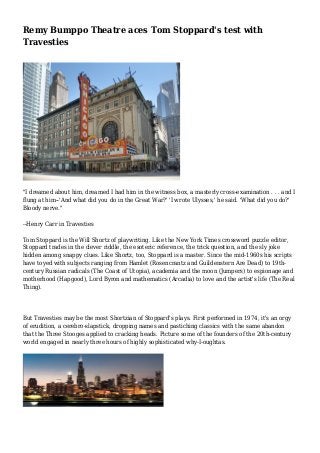
Remy Bumppo Theatre aces Tom Stoppard's test with Travesties
- 1. Remy Bumppo Theatre aces Tom Stoppard's test with Travesties "I dreamed about him, dreamed I had him in the witness box, a masterly cross-examination . . . and I flung at him--'And what did you do in the Great War?' 'I wrote Ulysses,' he said. 'What did you do?' Bloody nerve." --Henry Carr in Travesties Tom Stoppard is the Will Shortz of playwriting. Like the New York Times crossword puzzle editor, Stoppard trades in the clever riddle, the esoteric reference, the trick question, and the sly joke hidden among snappy clues. Like Shortz, too, Stoppard is a master. Since the mid-1960s his scripts have toyed with subjects ranging from Hamlet (Rosencrantz and Guildenstern Are Dead) to 19th- century Russian radicals (The Coast of Utopia), academia and the moon (Jumpers) to espionage and motherhood (Hapgood), Lord Byron and mathematics (Arcadia) to love and the artist's life (The Real Thing). But Travesties may be the most Shortzian of Stoppard's plays. First performed in 1974, it's an orgy of erudition, a cerebro-slapstick, dropping names and pastiching classics with the same abandon that the Three Stooges applied to cracking heads. Picture some of the founders of the 20th-century world engaged in nearly three hours of highly sophisticated why-I-oughtas.
- 2. And it's all based on fact. During World War I, neutral Switzerland was a magnet for Europe's better- quality refugees: artists and intellectuals looking for a place to carry on their investigations while the old order committed suicide. Vladimir Lenin was in Zurich during 1916 and '17, plotting revolution. So was James Joyce, plotting Ulysses. The Romanian-born avant-gardist Tristan Tzara was there too, carrying out Dada provocations at the Cabaret Voltaire, in collusion with folks like Jean/Hans Arp and Hugo Ball. Henry Carr? Also in Zurich, although not as a member of the international cutting edge. A wounded veteran of the war, Carr had what Stoppard has called a "small job" at the British consulate. He crossed paths with Joyce when the writer cast him as Algy Moncrieff in an amateur staging of Oscar Wilde's The Importance of Being Earnest. The role was a success for Carr but led to bad blood and years of litigation between him and Joyce, when Joyce refused to pay for the clothes Carr bought for his performance and Carr called Joyce some allegedly slanderous names in response. Stoppard typically uses minor personalities as the lenses through which his plays view major doings, the most famous example being poor Rosencrantz and Guildenstern, who experience Hamlet's tragedy in snatches of scenes and overheard dialogue, unaware that they exist for no reason other than to move it to its next phase. Carr is the lens for Travesties. The action turns on his decidedly faulty recollections as a semisenile old man.
- 3. But wait! There's more. Carr's account is framed, in turn, as a burlesque of The Importance of Being Earnest, allowing for romantic mind games to go with the more abstract ones practiced by Tzara, Joyce, and Lenin. As the sort of fool who's read Ulysses (most of it, anyway) and prides himself on working the Sunday Times crossword (most of it, anyway) in ink, I eat this stuff up, loving the layers, the gambits, the allusions. Stoppard always makes me glad I went to college, but here he offers nothing short of humanities heaven. Of course that delight carries its own negation: I'd hesitate to recommend Travesties to anybody even a little reluctant to tolerate its relentlessness, not to mention long speeches detailing the status of the arts in the dictatorship of the proletariat. There's a distinct languor during Stoppard's second act, when Lenin holds the floor. Interesting though Vladimir Ilyich may be as he struggles to turn his theories into politics, the passage probably felt more immediate before the fall of the USSR. Still, bailing on the play's complexities would mean missing not only its wit but a deeply smart, wildly energetic, neatly choreographed, often hilarious new production from Remy Bumppo Theatre. The whole company is delightful under Nick Sandys's direction, but Jeffrey Cummings's Carr, James Houton's Joyce, and Greg Matthew Anderson's Tzara are each especially marvelous in their own ways. Anderson in particular gives his character the aspect of a narcissistic dervish. Scott Olson, meanwhile, is amusingly dry as Carr's man, Bennett, who knows everything about everybody in the traditional manner of British downstairs help. (The three women--Kelsey Brennan, Meg Warner, and Jodi Kingsley--are all formidable but subsidiary: this is a work that orbits its Great Men.) Rachel Lambert's costumes are at once flamboyant and well honed. And, with little oddities like wallpaper on the wood floor, Joe Schermoly's set supplies an appropriate taste of Dada. v http://www.chicagoreader.com/chicago/remy-bumppo-theatre-tom-stoppard-travesties-james-joyce-le nin-dada/Content?oid=17244657